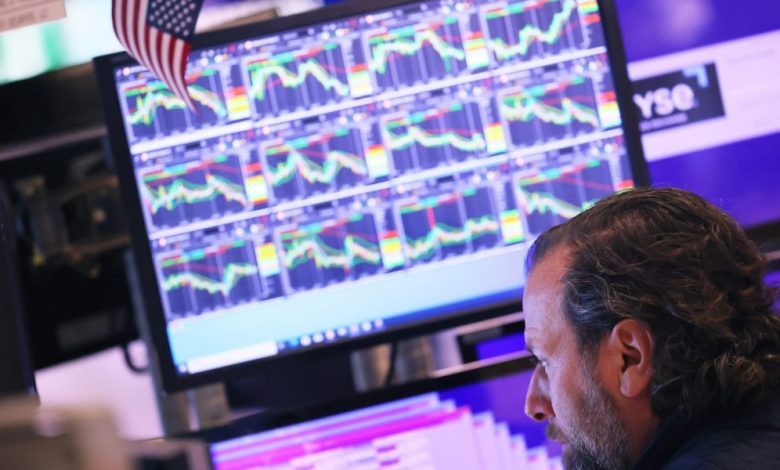Stock market believers are still saying the economy will accelerate

Stock market believers are looking past their toughest spell in months for US stocks, clinging to bets of a rally in the second half of the year once the Federal Reserve ends rate hikes.
The S&P 500 Index has had its worst week since December 9 as hotter-than-expected inflation data fueled speculation that the Fed will hike borrowing costs several more times and potentially pause in July. That’s a steeper path of monetary tightening than investors anticipated just a few weeks ago.
However, it’s still largely consistent with the theory that’s prevailed since late 2022 that stocks would struggle through the first six months of the year before picking up strength in the second half. Stock market technicals suggest that investors are agreeing with this logic as the S&P 500’s uptrend that began last fall is continuing, although the index is down 2.6% this month.
“We are nearing the end of the Fed’s interest rate cycle and markets will start to price this in,” said Mary Ann Bartels, chief investment strategist at Sanctuary Wealth.
Of course, there are many risks to these prospects. Swap traders see July peaking at around 5.4%, up from around 5% in early February. But a new paper argues it may need to rise as high as 6.5%, raising the specter of a so-called hard landing with the economy sliding into recession. In the rosier soft-landing scenario, the Fed tames inflation while the economy keeps growing.
“The market can handle a terminal yield of 5.5%, but it wouldn’t handle 6% or more,” Bartels said. “That would really shake up the markets.”
The alarming inflation numbers weren’t the only trigger for the S&P 500’s down week. Gloomy forecasts from the likes of Walmart Inc. and Home Depot Inc. also weighed on sentiment. This week brings more clues to consumer health, with earnings updates from Target Corp. and Lowe’s Cos.
The stock market slump may be disheartening, but based on historical patterns, shouldn’t come as a shock. February was among the worst months for the S&P 500 in the last 25 years, with an average loss of 0.4%, according to data compiled by Bloomberg. The benchmark gauge is down 2.6% this month after rising 6.2% in January.
For Bartels, every setback in the coming weeks and months is an opportunity to buy. She favors aerospace and defense stocks and semiconductors, which have rallied after a brutal 2022.
She is not alone. Ryan Detrick, chief markets strategist at Carson Group, is sticking to his bet that the US economy will sidestep an economic downturn. He believes inflation will continue to ease, and if interest rates stay elevated for longer, he recommends small-cap companies and large-cap industrials.
Fed prep
“The stage is still set for the US economy to accelerate in the second half of the year on the back of strong consumer spending,” he said. “That would be a boon for stocks.”
The next Fed interest rate decision is almost a month away, giving the market ample time to absorb a barrage of inflation, jobs and wage growth numbers. Traders are bracing for the Fed to potentially return to jumbo hikes: overnight index swaps are pricing in about 30 basis points of tightening for the March 22 announcement, and two-year Treasury yields hit their highest since on Friday 2007
That’s a toxic background for growth stocks, whose valuations are more sensitive to changes in interest rates. These stocks rallied sharply earlier this year on speculation that the Fed would soon halt its rate hikes. As that appears less likely, the tech-heavy Nasdaq 100 plunged 1.7% on Friday, eclipsing the S&P 500’s decline.
Even so, the bull case for equities remains as long as the Fed stays on the path it embarked on last year, according to Michael Antonelli, market strategist at Baird.
“Inflation will never fall in a straight line after it peaks,” he said. It would take a full quarter of hotter-than-expected inflation and employment data to force the Fed to sharply raise its final rate forecast, he estimated.
“The market doesn’t necessarily hate rate hikes,” he said. “It hates when hikes are bigger than expected or faster than expected.”
Learn how to navigate and build trust in your organization with The Trust Factor, a weekly newsletter exploring what leaders need to succeed. Login here.



